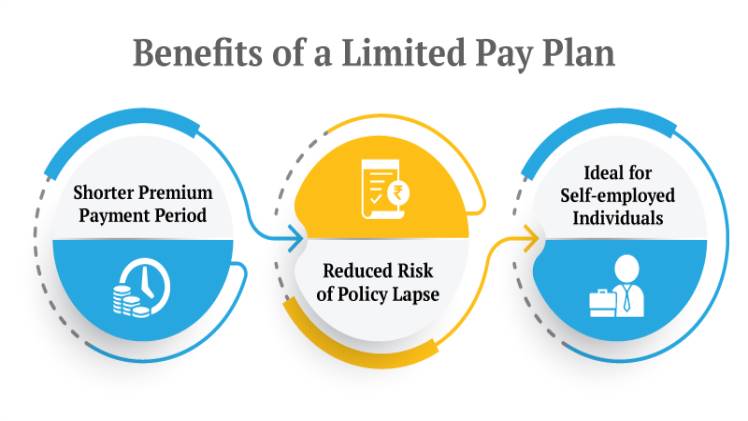What Is the Limited Pay Premium Payment Option?

Term insurance: What is it?
Term insurance is a pure life protection plan that provides significant coverage at affordable premiums. It is a useful insurance policy to protect your family members from mounting debt in the event that the family’s single breadwinner is not around. The term insurance plan pays the family the sum assured during the policy’s term in the event of an unfortunate passing away. Also, in addition to obtaining the death benefit, it enables your family to prepare for future obligations and cover their daily expenses in case of emergencies.
A life insurance calculator is a tool you may use online to determine the amount of coverage required based on your needs.
Limited Pay Term Insurance: What Is It?
A limited-pay term insurance plan is one of the types of life insurance that lets you pay a premium for a set period of time. With this plan, you are guaranteed coverage for a longer period of time, even if you stop making your monthly premium payments. The low rates and ongoing coverage of this plan are among its main benefits.
For instance: Vimal purchases a 20-year limited-term policy of insurance. He intends to make all required payments within ten years of the plan’s beginning because he is now earning well. In this case, Vimal will pay the premium over the course of 10 years, and the cover will last for the full 20 years of the term policy’s tenure.
Let’s talk in-depth about limited pay till ages 5, 10, and 60:
Only Pay Till 5
There is no single premium payment option available in Limited Pay till 5, but the premium payment term (PPT) is shorter than the policy term. Every life insurance policy might offer you a few possibilities for this scheme’s premium payment terms, including 5 years, 10 years, and 15 years. The premium will increase if your PPT is shorter.
Pay only until 10
The life assured under Limited Pay till 10 life insurance must pay a premium during the first 10 years of ownership of the policy, but the benefits are permanent. For instance, Ram, a 40-year-old man, purchases a 20-year term insurance policy with a limited payment option. He plans to retire at age 55 and intends to finish paying off all of his premium obligations in ten years.
Pay only until 60
Plans for limited pay term insurance provide you with the option to pay premiums just for a short time. One can, however, continue to be protected long after the limited-term premium period has ended. If you purchase limited-term life insurance for 80 years but only want to pay for 60 years, you can do so in limited pay till 60. In this scenario, you would be forced to pay a premium for 60 years, but the insurance would last until age 80. This merely means that you are exempt from payment for the remaining 20 years.
These types of life insurance are particularly advantageous for limited pay term insurance plans for people who are close to retirement age, have fluctuating financial conditions, unpredictable work environments, and variable income or salaries.
Varieties of Possible Premium Payment Methods
- Single Premiums: In this case, the premium is paid in whole at the time the insurance is purchased.
- Regular Premiums: Throughout the policy’s term, regular premium payments are made.
- Limited Premiums: This occurs when the life insurance coverage is longer than the time for which the premiums are paid.
Advantages of limited pay term insurance
- Choices for Longer Coverage: Since the premiums are only payable for a finite amount of time, you can select a term plan with coverage that lasts until retirement. This allows you to be protected from dangers for a longer period of time, which greatly increases the usefulness of the plan.
- Reduces the Risk of Policy Relapse: Because the premiums are only payable for a short time and you are not expected to pay premiums on time for a longer time period, limited pay-term insurance decreases the risk of policy relapse. Because the premium is paid early, there is less chance that the insurance will lapse.
- Tax advantages: Advantages Under Section 80C of the Income Tax Act of 1961, limited pay term insurance also provides tremendous tax advantages. Due to a limited plan’s higher premiums than a standard term insurance plan, the policyholder can deduct up to 1.5 lakhs from their taxable income.
A life insurance calculator is an easy-to-use tool to check the amount of premium you would have to pay.





